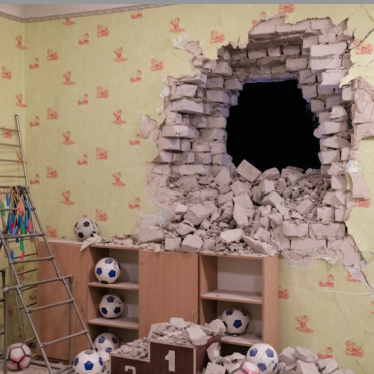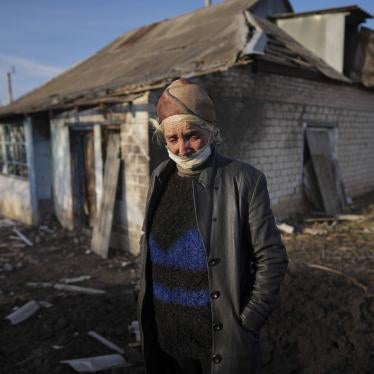"Chair Keating, Ranking Member Fitzpatrick, and Members of the Committee. Thank you for inviting me to participate in this hearing today.
I would like to highlight two types of weapons that Russian forces are using widely and with devastating effects on civilians and civilian structures in Ukraine: cluster munitions and explosive weapons with wide area effects.
The use of these types of weapons has a long history. I personally have documented cluster munition use in Afghanistan, Iraq, Israel, Lebanon, and Georgia, and investigated the effects of explosive weapons in populated areas on health care in eastern Ukraine in 2016.[1] My Human Rights Watch colleagues have done extensive research on these weapons in numerous other conflicts, including most recently in Libya, Nagorno-Karabakh, Syria, and Ukraine (2014-2015).[2] We are applying this expertise and methodology to the current armed conflict in Ukraine, both in on-the-ground and remote research.
Russia has been using cluster munitions in Ukraine since the beginning of its full-scale invasion. On February 24, Russian forces launched a cluster munition ballistic missile attack that struck near a hospital in the Donetska region, killing four civilians and wounding 10.[3]
Four days later, Russian rockets with cluster munition warheads rained submunitions down on three neighborhoods in the city of Kharkiv. One resident told Human Rights Watch, “The bangs lasted for about two minutes. When I went out, I saw three covered bodies lying in the street and one wounded person being taken away by emergency services.”[4]
Cluster munitions are large weapons containing dozens or hundreds of smaller weapons called submunitions. They endanger civilians at the time of attack, especially when used in towns and cities as they have been in Ukraine, because they spread their submunitions over an area the size of a football field. In addition, many of the submunitions fail to explode on impact, and they linger like landmines for months, years, or decades.
Russia is not a party to the Convention on Cluster Munitions, the international treaty that comprehensively bans these weapons. But Russia’s cluster munition attacks have been unlawful because they involve inherently indiscriminate weapons that cannot distinguish between combatants and civilians. Individuals responsible for ordering or carrying out cluster munition attacks against civilians or civilian objects with criminal intent, that is either intentionally or recklessly, would be committing war crimes.
Russian forces’ use of explosive weapons with wide area effects in populated areas represents an even greater peril for civilians in Ukraine. Explosive weapons include a range of munitions, such as artillery shells, rockets, missiles, and aerial bombs. The harm they cause is magnified when they have wide area effects—that is, they have a large blast or fragmentation radius, are inherently inaccurate, or deliver multiple munitions at the same time (like cluster munitions).
Russian forces’ use of these weapons in Ukraine’s cities and towns has been catastrophic, and the United Nations Office of the High Commissioner for Human Rights highlighted it as a major cause of the more than 1,500 civilian casualties it had recorded as of March 9.[5]
On March 3 at noon, for example, Russian aircraft dropped multiple unguided bombs on a residential neighborhood of Chernihiv, a city in northeastern Ukraine. The attack killed at least 47 people, according to local officials, and wounded many others. It also significantly damaged a high-rise apartment building, a hospital, a pharmacy, and several other civilian structures.[6]
A doctor at the hospital described the blast as a “windstorm” that filled the basement with dust. He treated children with fragment wounds, including an 11-year-old boy with metal shards in his brain and damage to his skull.[7]
In addition to the immediate civilian casualties and structural damage caused, the use of explosive weapons with wide area effects in populated areas produces long-term reverberating effects. Destruction of infrastructure, such as power plants or water treatment facilities, interferes with basic services, including health care and education, and in turn infringes on human rights. Large numbers of civilians become displaced.[8] The consequences of Russian forces’ bombing and shelling of Ukraine’s population centers will endure long after active hostilities end.
Given the well-documented pattern of direct and reverberating effects, the use of explosive weapons with wide area effects in populated areas heightens concerns that attacks are indiscriminate and disproportionate, and thus unlawful. Individuals carrying out such attacks with criminal intent are responsible for war crimes.
We are glad to hear the United States will support investigations by the International Criminal Court into alleged war crimes in Ukraine. In light of the massive civilian harm caused by Russia’s use of these weapons, and the possibility Ukraine could also use them, we urge the United States to take two additional steps:
First, the US should condemn the use of cluster munitions and explosive weapons with wide area effects in populated areas. At least seven NATO countries and the NATO secretary-general have already spoken out against Russia’s use of cluster munitions, and such international pressure can make a difference.[9]
Second, the US should strengthen its own policies on both types of weapons. The US should join the Convention on Cluster Munitions, which has 110 states parties including most NATO member states.[10]
At a minimum, the US should reinstate a policy signed in 2008 by then-Secretary of Defense Robert Gates, which required the US to cease using all cluster munitions with a more than 1 percent failure rate by 2018.[11] The Trump administration reversed that policy with a 2017 Department of Defense policy memo indefinitely delaying implementation of that ban on using unreliable types of cluster munitions.[12]
In addition, at the upcoming negotiations of a new international political declaration on explosive weapons in early April, the US should agree to a commitment to avoid the use of explosive weapons with wide area effects in populated areas.[13]
Thank you again for allowing me to testify. I am happy to answer any questions you may have."
For more information, see the following Human Rights Watch publications:
- “Ukraine: Shelling Residential Areas Puts Civilians at Risk,” news release, February 18, 2022, https://www.hrw.org/news/2022/02/18/ukraine-shelling-residential-areas-puts-civilians-risk
- “Russia, Ukraine & International Law: On Occupation, Armed Conflict and Human Rights,” questions and answers, February 23, 2022, https://www.hrw.org/news/2022/02/23/russia-ukraine-international-law-occupation-armed-conflict-and-human-rights#
- “Ukraine: Russian Cluster Munition Hits Hospital,” news release, February 25, 2022, https://www.hrw.org/news/2022/02/25/ukraine-russian-cluster-munition-hits-hospital
- “Ukraine: Countries Request ICC War Crimes Inquiry,” news release, March 2, 2022, https://www.hrw.org/news/2022/03/02/ukraine-countries-request-icc-war-crimes-inquiry
- “Ukraine: Cluster Munitions Launched into Kharkiv Neighborhoods,” news release, March 4, 2022, https://www.hrw.org/news/2022/03/04/ukraine-cluster-munitions-launched-kharkiv-neighborhoods
- Ken Roth, “How Far Will Russian Forces Go in Ukraine?” Guardian, March 4, 2022, https://www.hrw.org/news/2022/03/04/how-far-will-russian-forces-go-ukraine
- “Enhanced Blast Weapons in Ukraine,” backgrounder, March 7, 2022, https://www.hrw.org/news/2022/03/07/enhanced-blast-weapons-ukraine
- Yulia Gorbunova, “Under Shelling in Kharkiv: Persons with Disabilities Need to Evacuate Safely,” dispatch, March 7, 2022, https://www.hrw.org/news/2022/03/07/under-shelling-kharkiv
- “Ukraine: Russian Assault Kills Fleeing Civilians,” news release, March 8, 2022, https://www.hrw.org/news/2022/03/08/ukraine-russian-assault-kills-fleeing-civilians
- “Ukraine: Russian Air-Dropped Bombs Hit Residential Area,” news release, March 10, 2022, https://www.hrw.org/news/2022/03/10/ukraine-russian-air-dropped-bombs-hit-residential-area
- Yasmine Ahmed, “World Must Send a Clear Message After Brutal Use of Cluster Bombs,” The Express, March 11, 2022, https://www.hrw.org/news/2022/03/11/world-must-send-clear-message-after-brutal-use-cluster-bombs
[1] Human Rights Watch, Fatally Flawed: Cluster Bombs and Their Use by the United States in Afghanistan (2002); Off Target: The Conduct of the War and Civilian Casualties in Iraq (2003); Civilians under Assault: Hezbollah’s Rocket Attacks on Israel in the 2006 War (2007); Flooding South Lebanon: Israel’s Use of Cluster Munitions in Lebanon in July and August 2006 (2008); and A Dying Practice: Use of Cluster Munitions by Russia and Georgia in August 2008 (2009); Harvard Law School’s International Human Rights Clinic and PAX, Operating Under Fire: The Effects of Explosive Weapons on Health Care in the East of Ukraine (2016), http://hrp.law.harvard.edu/wp-content/uploads/2017/05/Operating-under-Fire-2017b-secured.pdf.
[2] See, for example, “Syria: Cluster Munition Attack on School,” Human Rights Watch news release, January 22, 2020, https://www.hrw.org/news/2020/01/22/syria-cluster-munition-attack-school.
[3] “Ukraine: Russian Cluster Munition Hits Hospital,” Human Rights Watch news release, February 25, 2022, https://www.hrw.org/news/2022/02/25/ukraine-russian-cluster-munition-hits-hospital.
[4] “Ukraine: Cluster Munitions Launched into Kharkiv Neighborhoods,” Human Rights Watch news release, March 4, 2022, https://www.hrw.org/news/2022/03/04/ukraine-cluster-munitions-launched-kharkiv-neighborhoods.
[5] “Russian Attacks on Civilian Targets in Ukraine Could be a War Crime: UN Rights Office,” UN news release, March 11, 2022, https://news.un.org/en/story/2022/03/1113782#:~:text=Up%20to%20midnight%20on%209,likely%20to%20be%20considerably%20higher.
[6] “Ukraine: Russian Air-Dropped Bombs Hit Residential Area,” Human Rights Watch news release, March 10, 2022, https://www.hrw.org/news/2022/03/10/ukraine-russian-air-dropped-bombs-hit-residential-area# .
[7] Ibid.
[8] See, for example, Harvard Law School’s International Human Rights Clinic and PAX, Operating Under Fire.
[9] NATO member countries that have spoken out against Russia’s cluster munition use are: Belgium, Canada, France, Italy, the Netherlands, Norway, and the United Kingdom.
[10] Convention on Cluster Munitions, adopted May 30, 2008, entered into force August 1, 2010. For a current list of states parties, see https://www.clusterconvention.org/states-parties/.
[11] DoD Policy on Cluster Munitions and Unintended Harm to Civilians, June 19, 2008, https://web.archive.org/web/20080915130914/http:/www.defenselink.mil/news/d20080709cmpolicy.pdf.
[12] DoD Policy on Cluster Munitions, November 30, 2017, https://dod.defense.gov/Portals/1/Documents/pubs/DOD-POLICY-ON-CLUSTER-MUNITIONS-OSD071415-17.pdf.
[13] Reaching Critical Will, “Process for a Political Declaration on the Use of Explosive Weapons in Populated Areas,” https://reachingcriticalwill.org/disarmament-fora/ewipa/political-declaration; Ireland’s Department of Foreign Affairs, “Protecting Civilians in Urban Warfare,” https://www.dfa.ie/our-role-policies/international-priorities/peace-and-security/ewipa-consultations/.








